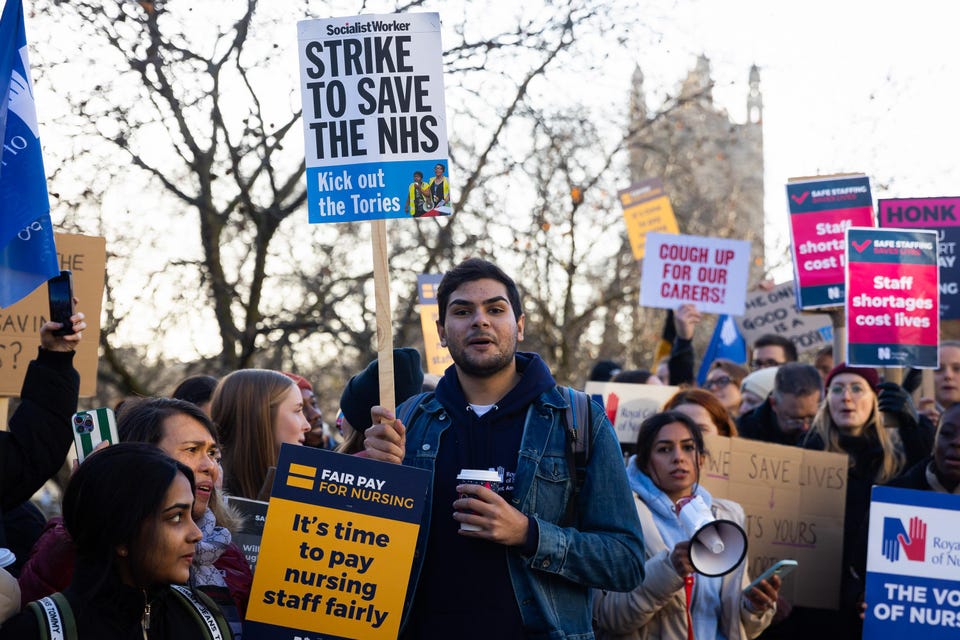U.K. Nurse Strikes: Unions Announce Bigger Action Ahead


LONDON, UNITED KINGDOM – 2022/12/20: Nurses hold placards expressing their opinion during the … [+] demonstration outside St Thomas’ Hospital in London. The Royal College of Nursing has called its members to strike in England, Wales and Northern Ireland over pay and working conditions where the government still refuses to offer a pay rise. (Photo by Tejas Sandhu/SOPA Images/LightRocket via Getty Images)
SOPA Images/LightRocket via Getty Images
Nurses are set to walk out again in England and Wales next month should the government fail to agree a new pay deal with unions.
The Royal College of Nursing — the largest nursing union in the world — says staff at dozens of hospitals will strike on February 6 and February 7; three weeks from now.
These are the latest in a series of strikes that has seen public sector healthcare workers restrict their activities in a bid to secure higher pay for the current financial year.
Nurses and ambulance staff have already walked out several times in recent weeks, with some doctors currently voting on whether to launch their own industrial action in March.
If they go ahead, the next nursing strikes will take place at 73 hospital trusts: nearly 30 more than the first walk outs in December, and almost 20 more than during industrial action this week.
Nurses performing life-saving care will be exempt from strike action to protect patient safety. In December and January, protected services included chemotherapy, dialysis, intensive care and children’s emergency care.
But the walkouts still have a major impact on hospitals, with non-urgent services likely to be seriously affected. Thousands of appointments have had to be rescheduled in recent weeks because of strikes, adding pressure to already overstretched services.
England’s waiting list for planned procedures like cataracts and hip replacements is currently over 7 million.
Meanwhile, hospitals and ambulance trusts are battling a crisis in emergency care. Factors including a lack of adequately staffed beds — in hospitals and social care settings — are leading to lengthy emergency room waits and ambulance queues.
Although union leaders have met with U.K. government officials to discuss the strikes, they say ministers refuse to engage in “serious” negotiations over pay.
Unions argue the strikes are about protecting the country’s long-understaffed health service. Better pay and working conditions, they say, will not just attract new staff but help retain existing nursing staff.
But the government argues increasing pay will be expensive and fuel already-high inflation.
Announcing the escalated action on Monday, RCN general secretary and chief executive Pat Cullen said in a statement: “It is with a heavy heart that nursing staff are striking this week and again in three weeks.
“We are doing this in a desperate bid to get ministers to rescue the NHS. The only credible solution is to address the tens of thousands of unfilled jobs – patient care is suffering like never before.
“My olive branch to governments — asking them to meet me halfway and begin negotiations — is still there. They should grab it.”
Saffron Cordery, interim boss of hospital management body NHS Providers, called February’s round of strikes “very worrying.”
She said in a statement: “We’ve seen how disruptive these strikes can be, and more extensive industrial action is likely to have an even greater impact. Nobody wants this to continue happening.”
Cordery, whose organisation represents hospital executives, said she understands the “frustration” nurses are feeling and “how they have got” to this point.
“Below-inflation pay awards, the cost-of-living crisis, severe staff shortages and increasing workloads have created near-impossible conditions,” she added.
But with three weeks left before February’s strike dates, she argued there was “more than enough time” for government and unions to begin formal pay negotiations and avoid further industrial action.
